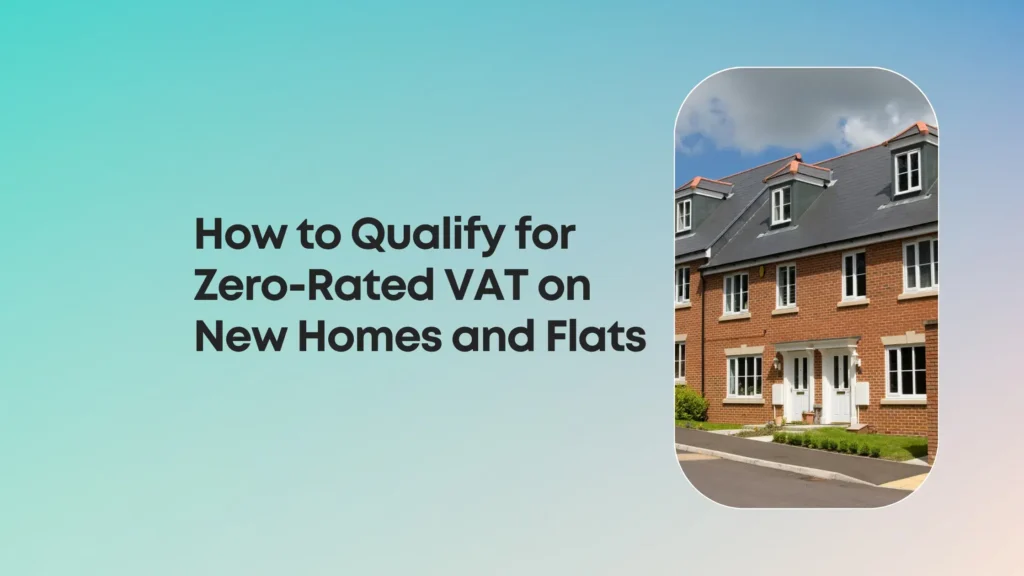Zero-rated VAT on new homes and flats means no VAT is charged on the construction of a new residential property. Unlike standard VAT (20%) or reduced VAT (5%), zero-rated VAT keeps costs lower for buyers while still allowing builders and developers to reclaim VAT on construction expenses, making new homes more affordable. However, not all new homes qualify; only those that meet specific HMRC criteria, such as being a self-contained dwelling intended for residential use. In this article, we’ll cover why zero-rated VAT matters, who qualifies, and the conditions you need to meet to take advantage of this benefit.
Why Zero-Rated VAT Matters for New Homes and Flats
1. Makes New Residential Housing More Affordable
One of the biggest advantages of zero-rated VAT is that it reduces the overall cost of buying a new home or flat. Since no VAT is added to the purchase price, buyers don’t face an extra 20% tax on top of what is already a large investment. Makes new build properties more affordable, especially for first time buyers.
2. Encourages Property Development
Builders and developers can reclaim the VAT they pay on materials and services used in construction because the sale of new residential properties is zero rated. However, it’s important to note that the zero rate itself does not automatically give the right to reclaim VAT the property must qualify under HMRC’s criteria.
3. Supports Self-Builders and Fairness in the Market
Zero rated VAT also benefits individuals who want to build their own homes. Under the DIY Housebuilders’ Scheme, self-builders can reclaim VAT on certain construction costs. This ensures they aren’t at a disadvantage compared to those buying from a professional developer, creating a fairer system where anyone investing in a new home isn’t penalised by extra tax.
Who Qualifies for Zero Rated VAT?
Zero-rated VAT is designed to encourage the creation of new homes in the UK. Not everyone qualifies, but three main groups can benefit: developers, housing associations, and self-builders.
1. Developers
Developers who build brand new houses or flats that have never been lived in before can sell them at a zero VAT rate. It means buyers don’t have to pay VAT on the property price, and developers can reclaim VAT on building costs such as materials and services. This system helps developers keep prices competitive while still covering their expenses.
2. Housing Associations
Registered housing associations also qualify for zero rated VAT when they build . Since many housing associations focus on affordable and social housing, being able to reduce costs through zero rated VAT means they can provide more homes at reasonable rents, supporting people who might otherwise struggle in the housing market.
3. Self-Builders
Individuals who take on the challenge of building their own home also fall under this scheme. While they usually pay VAT on materials and services during the build, they can reclaim this VAT from HMRC once the project is complete. Ensures self-builders aren’t at a disadvantage compared to buying a new build from a developer.
Accountancy Services for
Construction Companies
→ Enjoy 60 Days Free Trial
→ No Strings Attached, No Catch!
Book an AppointmentLearn MoreConditions for Zero-Rated VAT
Not every property qualifies for zero rated VAT. To benefit, the building project must meet specific conditions set by HMRC. The main requirements are:
1. It Must Be a New Dwelling
The property has to be newly built and never lived in before. Renovations or extensions to existing homes never qualify. The aim is to encourage the creation of brand new housing rather than upgrades to older ones.
2. It Must Be Self-Contained
For a property to qualify, it must be completely self-contained, meaning it should have its own separate entrance and facilities, such as a kitchen, bathroom, and living space. Flats within a block can also qualify, provided each flat is independent and doesn’t rely on shared living facilities.
3. It Must Have Residential Planning Permission
The property must have planning permission for residential use. If the building is approved for commercial purposes (like an office or shop), it won’t qualify for zero-rated VAT. Having the correct planning status ensures the property is recognised as a permanent home.
When Zero-Rating Does Not Apply
While zero-rated VAT offers big savings, it doesn’t apply in every situation. HMRC sets clear rules, and certain projects fall outside the scheme. Here are the main cases where zero-rating does not apply:
1. Renovations or Conversions
If you’re improving, extending, or converting an existing home, the project usually won’t qualify for zero rated VAT. Instead, some conversions or certain energy-saving improvements may be charged at the reduced 5% rate, but they’re not fully zero-rated.
2. Commercial Builds
New buildings designed for commercial purposes such as offices, shops, or warehouses do not qualify for zero-rated VAT. The scheme is strictly for new residential dwellings, not business-related construction.
3. Planning Restrictions Blocking Separate Use
Zero rated VAT only works if the property can be used as a separate home. If planning rules prevent it from being used on its own, such as when it is attached to another building or has use limits, it does not qualify for zero rated VAT.
To qualify for zero-rated VAT on new homes and flats, the property must be newly built, self-contained, and have residential planning permission. Developers, housing associations, and self-builders can benefit, but the rules must be followed carefully. It’s important to keep proper records and seek professional advice to confirm eligibility and maximise financial benefits.
It’s a good idea to get advice from accountants to avoid mistakes and save money. With the right steps, zero-rated VAT can make building or buying a new home easier and more affordable.

